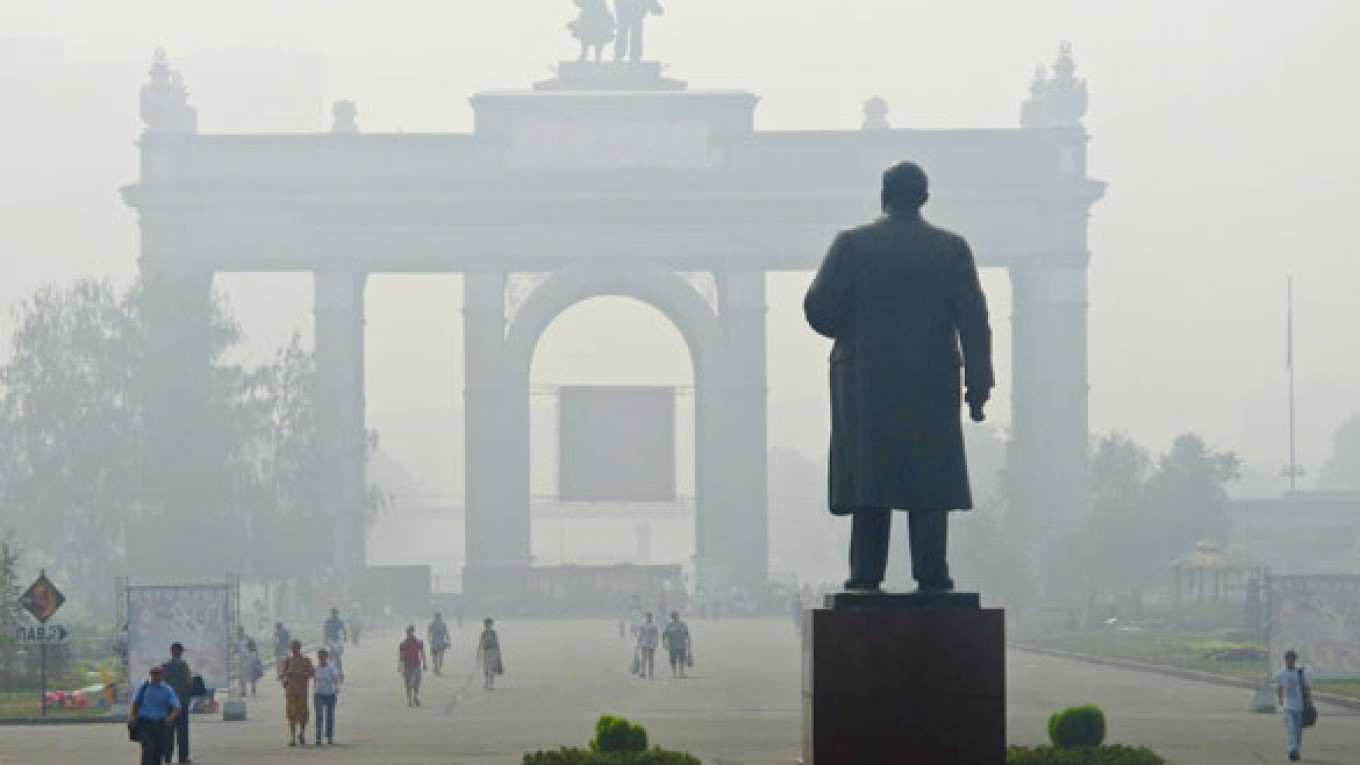As the death toll from wildfires rose to 40 on Monday, environmentalists accused the government of shortsighted policies that have hindered firefighting efforts, and people hoping for quick money let their homes go up in flames.
President Dmitry Medvedev declared a state of emergency in seven areas: the Moscow, Vladimir, Ryazan, Voronezh and Novgorod regions, as well as the republics of Mordovia and Marii-El.
Smoke from the Moscow region fires blanketed the capital in thick smog.
But firefighters seemed to be making progress, with fires covering 125,000 hectares, compared with 128,000 hectares on Sunday, Vladimir Stepanov, a senior Emergency Situations Ministry official, said in televised remarks.
Environmentalists said the consequences of the fires are so dire because a centralized woodland-fire control system was canceled by the 2007 Forest Code, a law lobbied by timber-processing companies and signed by then-President Vladimir Putin.
"Formerly, each forest had a man who would discover fires at an early stage," Alexei Yaroshenko, a forestry expert at Greenpeace Russia, told The Moscow Times.
But under the new system, the number of personnel employed in fieldwork has been cut by 75 percent, while 12,000 new bureaucrats were hired to do related office work, he said.
In addition, it may take a week to move firefighting equipment from one location to another, while it only took a day before the 2007 law went into force, he said.
"There is no central body to oversee the transfer of equipment because it was broken into several structures," he said.
Putin, who is now prime minister, did not comment on the criticism Monday during a meeting with governors from the fire-hit regions, telling them that “besides urgent measures, we should make decisions in perspective.”
Putin said all forces, including volunteers, should be mobilized for the fight to "extinguish everything," and that "the main task remains the protection of inhabited settlements,” according to the transcript of the meeting published on the government's web site.
All state-owned helicopters must be equipped for firefighting, regardless of what agency they belong to, Putin said. He also asked the governors to visit the sites of the fires and talk with people there.
Putin ordered the initiation of new federal and regional fire prevention programs.
The government has pledged to pay 3 million rubles ($100,000) to owners whose houses burned down in the wildfires. Putin said Monday that those who lost any other property would receive 200,000 rubles ($6,630) as compensation.
Some rural residents in the Voronezh and Vladimir regions have let the fires burn their houses in hope of getting new ones, Ekho Moskvy radio reported Monday.
Costs of damages nationwide reached 6.5 billion rubles ($215 million), Regional Development Minister Viktor Basargin said Monday, Itar-Tass reported.
At least 1,862 houses were damaged by fires as of Sunday, the Regional Development Ministry said. Medvedev said Monday that more than 2,000 people have been left homeless.
About 155,000 people were fighting fires on Monday, and another 81,000 were waiting in reserve in case the situation got worse, the Emergency Situations Ministry said in a statement. Also deployed were 25,000 firefighting vehicles and 20 aircraft.
Meanwhile, the Federal Security Service opened an inquiry into a shortage of fuel for firefighting helicopters, Lifenews.ru reported, citing an unidentified source at the Emergency Situations Ministry.
"Now it has turned out that there is hardly any fuel left for the aircraft fighting fires in the Moscow region," the source was quoted as saying.
The report did not elaborate on what had caused the fuel shortage.
Russian Orthodox Patriarch Kirill said Russians should seek to stop sinning in order to end a record drought that has stoked the fires.
"One shouldn't think that the drought will pass if we just pray to God and then forget and fall into sin," Kirill said during a visit to the town of Lukoyanov in the Novgorod region, Interfax reported.
He cited an Old Testament story about a drought sent on the Jews for worshipping a pagan god and said Russians should turn into "a different people" by abandoning their sins.
A Message from The Moscow Times:
Dear readers,
We are facing unprecedented challenges. Russia's Prosecutor General's Office has designated The Moscow Times as an "undesirable" organization, criminalizing our work and putting our staff at risk of prosecution. This follows our earlier unjust labeling as a "foreign agent."
These actions are direct attempts to silence independent journalism in Russia. The authorities claim our work "discredits the decisions of the Russian leadership." We see things differently: we strive to provide accurate, unbiased reporting on Russia.
We, the journalists of The Moscow Times, refuse to be silenced. But to continue our work, we need your help.
Your support, no matter how small, makes a world of difference. If you can, please support us monthly starting from just $2. It's quick to set up, and every contribution makes a significant impact.
By supporting The Moscow Times, you're defending open, independent journalism in the face of repression. Thank you for standing with us.
Remind me later.


